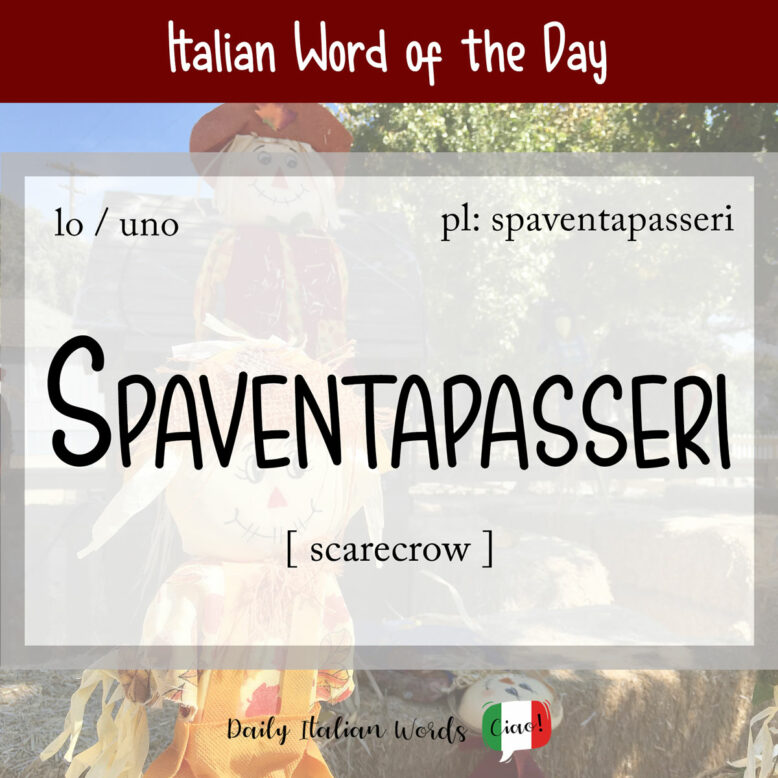Wherever there are fields with growing crops and birds in the vicinity, you will typically come across a scarecrow, known as spaventapasseri in Italian. They’ve long been used to dissuade these cunning winged gluttons from destroying the harvest.
spaventapasseri
scarecrow

Spaventapasseri is made up of two parts: the verb spaventare (to scare) and passeri, the plural of passero meaning sparrow. It’s intriguing that in English, we emphasise the threat of the crow (which is corvo in Italian), whereas Italians consider the sparrow to be the greater threat.
I corvi sono troppo intelligenti per lasciarsi spaventare da uno spaventapasseri.
Crows are too intelligent to be scared off by a scarecrow.
Because it is a masculine noun beginning with sp-, it takes the following definite and indefinite articles. It is also invariable, meaning that the singular and plural forms are identical.
- lo spaventapasseri = the scarecrow
- gli spaventapasseri = the scarecrows
- uno spaventapasseri = a scarecrow
- degli spaventapasseri = (some) scarecrows

Farmers worldwide have employed scarecrows since ancient times. According to Focus.it, miniature statues of the guardian deity Priapus were used in Ancient Rome to deter birds, as noted by the 1st-century BC poet Tibullus in his first book of poetry.
And in the garden let Priapus stand
To frighten birds, his sickle in his hand.
(Translation from Latin Lyric and Elegiac Poetry)
Un vermiglio Priapo sia messo a custodia dell’orto abbondante di frutta,
perché con terribile falce cacci lontano gli uccelli.
(Translation: F. Della Corte)
Lo spaventapasseri ha una testa di zucca con sopra un cappello da contadino.
The scarecrow has a pumpkin head with a farmer’s hat on top.
An alternative term for spaventapasseri is spauracchio, which outside of the world of agriculture, can also refer to the bogeyman. This word is derived from the verb spaurare, which in poetic or literary contexts means “to scare.”
The suffix -acchio is similiar to our -er in English in that it denotes something that fulfils a specific action or purpose. (In this case, the spauracchio fulfils the act of scaring off birds – it’s a “scarer”.)

Sometimes you will hear scarecrows referred to as fantocci (puppets, dolls, dummies) or manichini (dummies, manequins).
To conclude, here is a lovely poem by Natalina Laganà called Lo Spaventapasseri, along with its English translation. Can you understand it without looking at the translation?
Lo spaventapasseri
Fare lo spaventapasseri
ti pare poco?
Hai pensato
al lavoro dell’uomo
che ha coltivato il grano,
lui non era di paglia.
Hai pensato
su quei panni vecchi
quanta vita è passata,
il tempo trascorso
e le stagioni andate
per far crescere il legno
che fa da sostegno.
Sul cappello sfilacciato
due passeri si corteggiano.
Lì, in mezzo al campo,
inzuppato dalla pioggia
e asciugato dal sole,
chi dice a far spavento,
io dico a mettere allegria.
E se guardi,
dentro la vecchia camicia
un cuore batte
anche se
non si può vedere.
The scarecrow,
Is being a scarecrow
too modest a role for you?
Have you considered
the toil of the man
who tilled the wheat,
he wasn’t made of straw.
Have you pondered
on those tattered clothes,
how much life has slipped by,
the time that’s gone,
and the seasons passed
to grow the wood
that lends its support.
On the worn hat,
two sparrows court each other.
There, in the midst of the field,
soaked by the rain,
and dried by the sun,
Those who say he’s there to frighten,
I say he brings cheer.
And if you peer inside
the aged shirt,
a heart beats there,
even if
it can’t be seen.
Heather Broster is a graduate with honours in linguistics from the University of Western Ontario. She is an aspiring polyglot, proficient in English and Italian, as well as Japanese, Welsh, and French to varying degrees of fluency. Originally from Toronto, Heather has resided in various countries, notably Italy for a period of six years. Her primary focus lies in the fields of language acquisition, education, and bilingual instruction.


